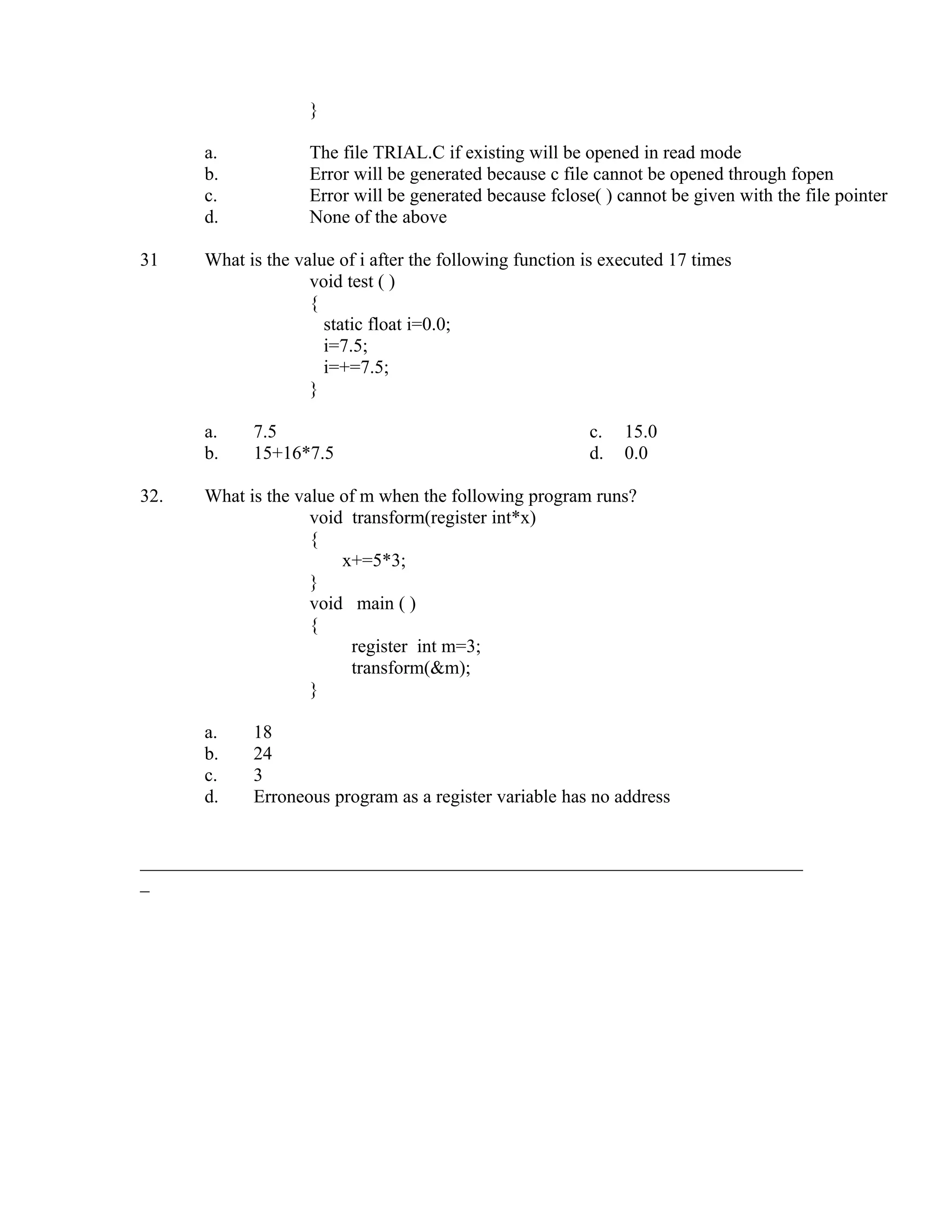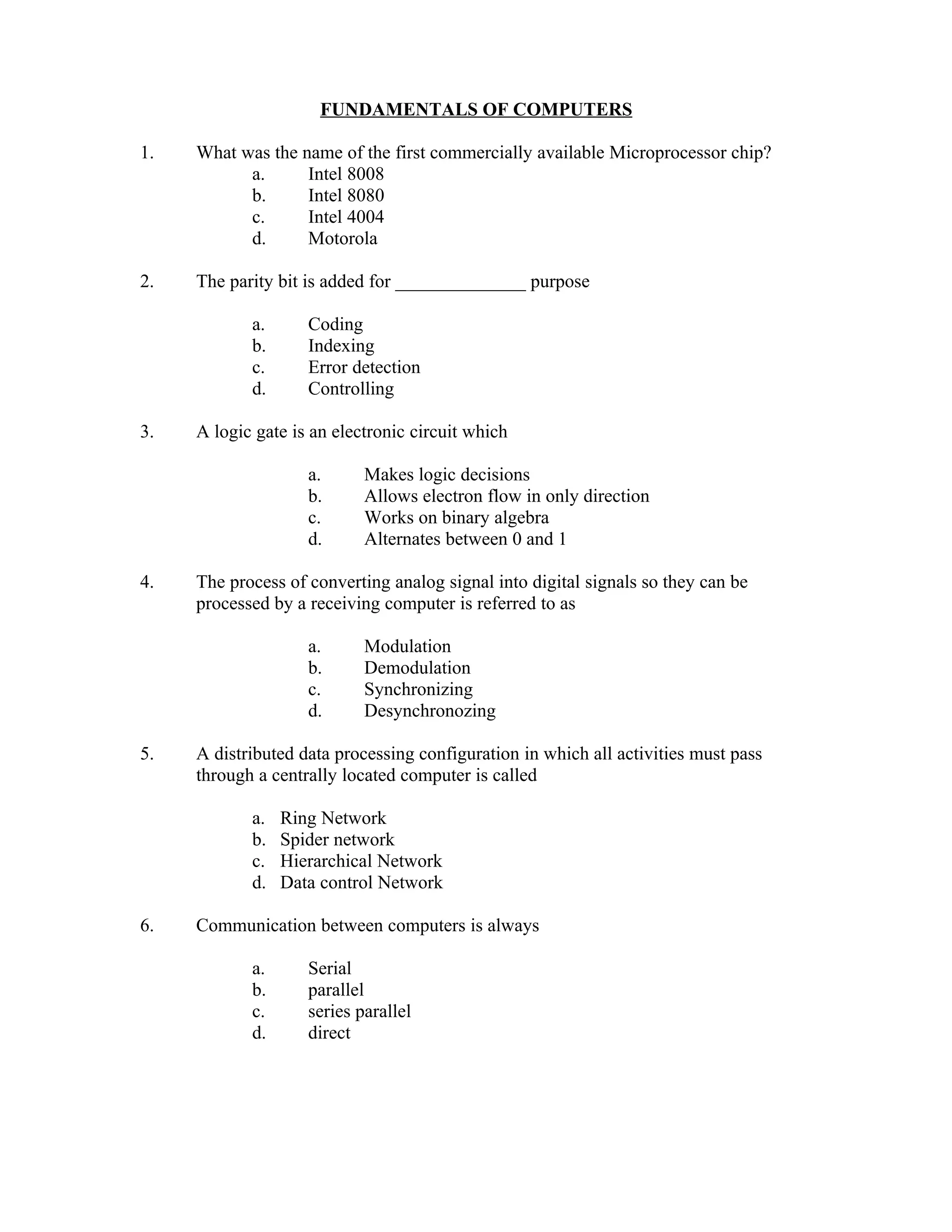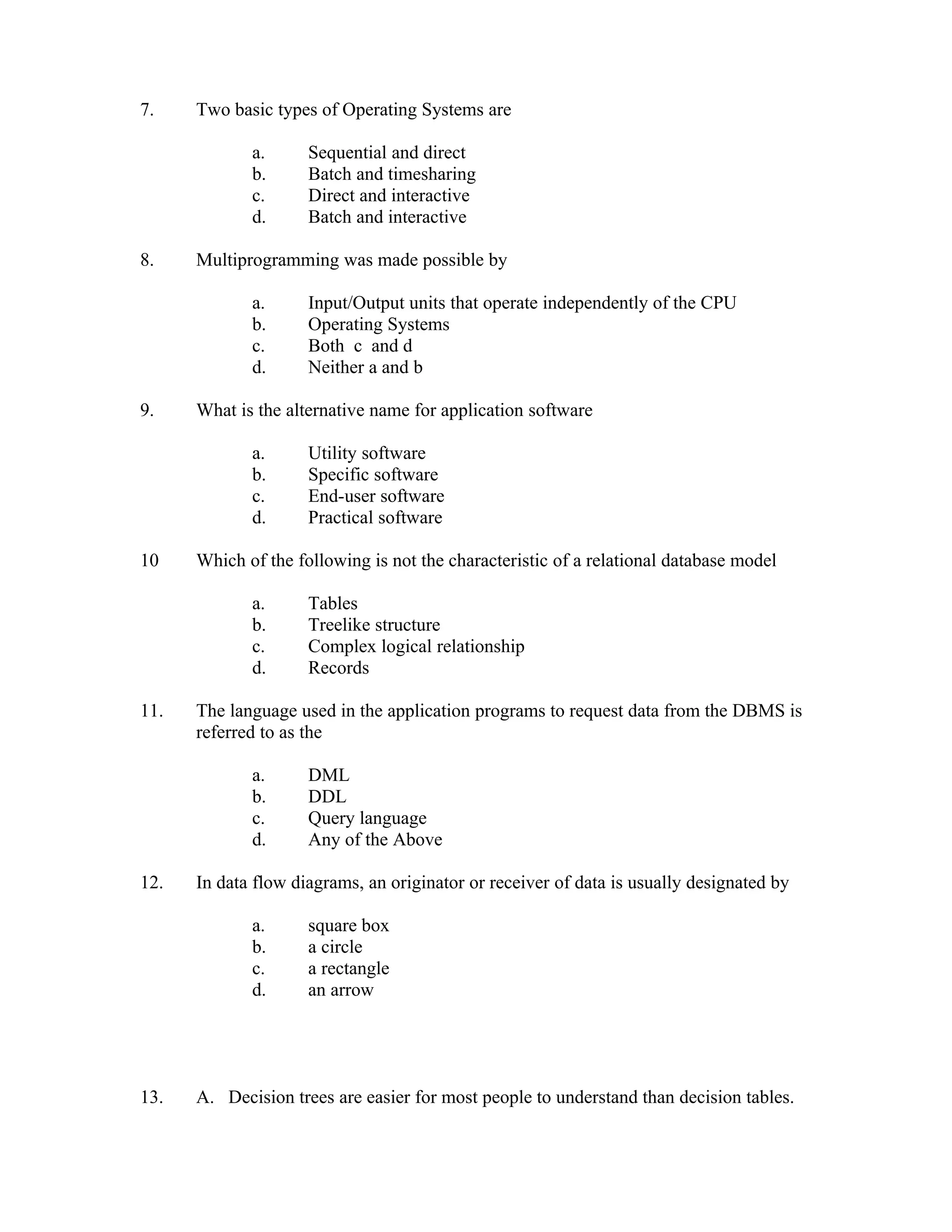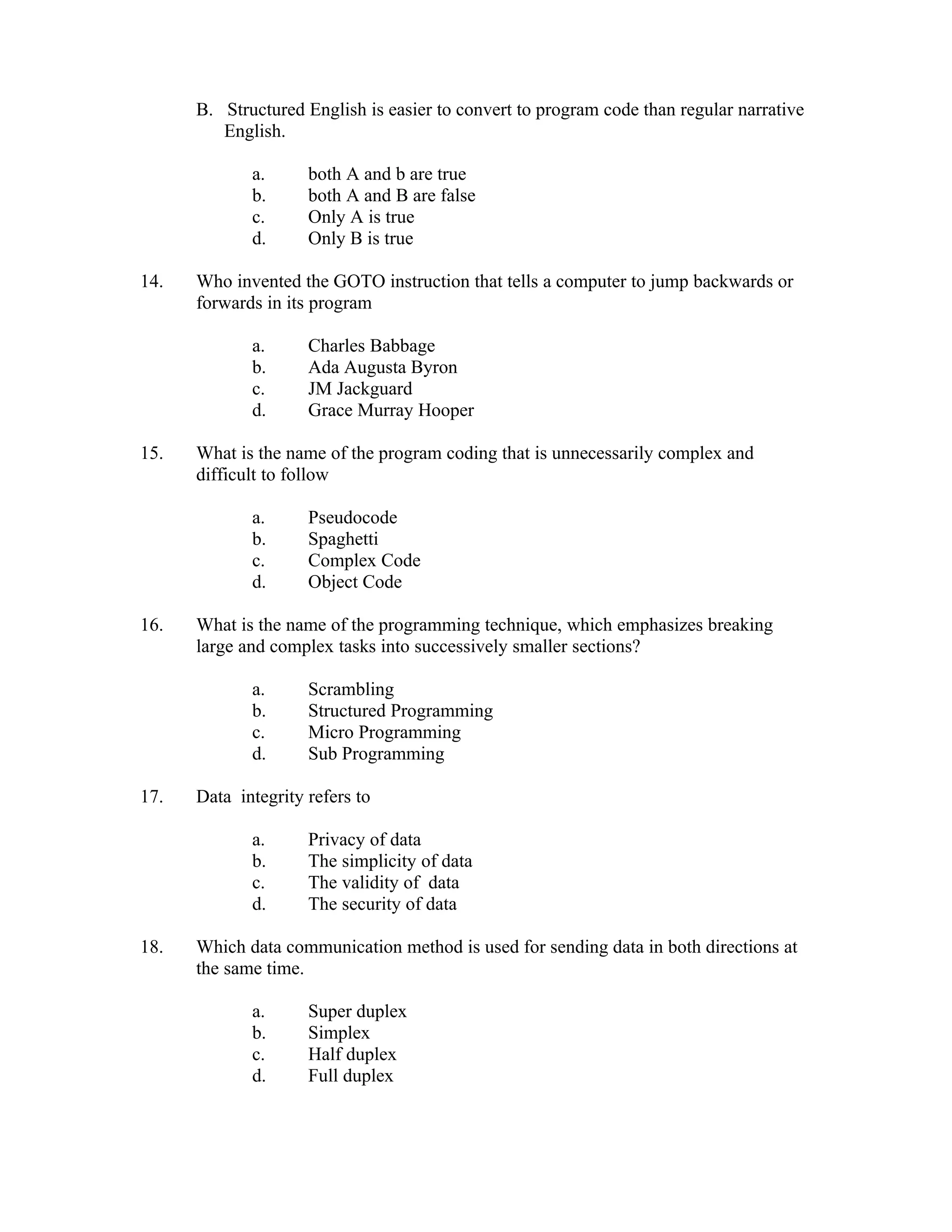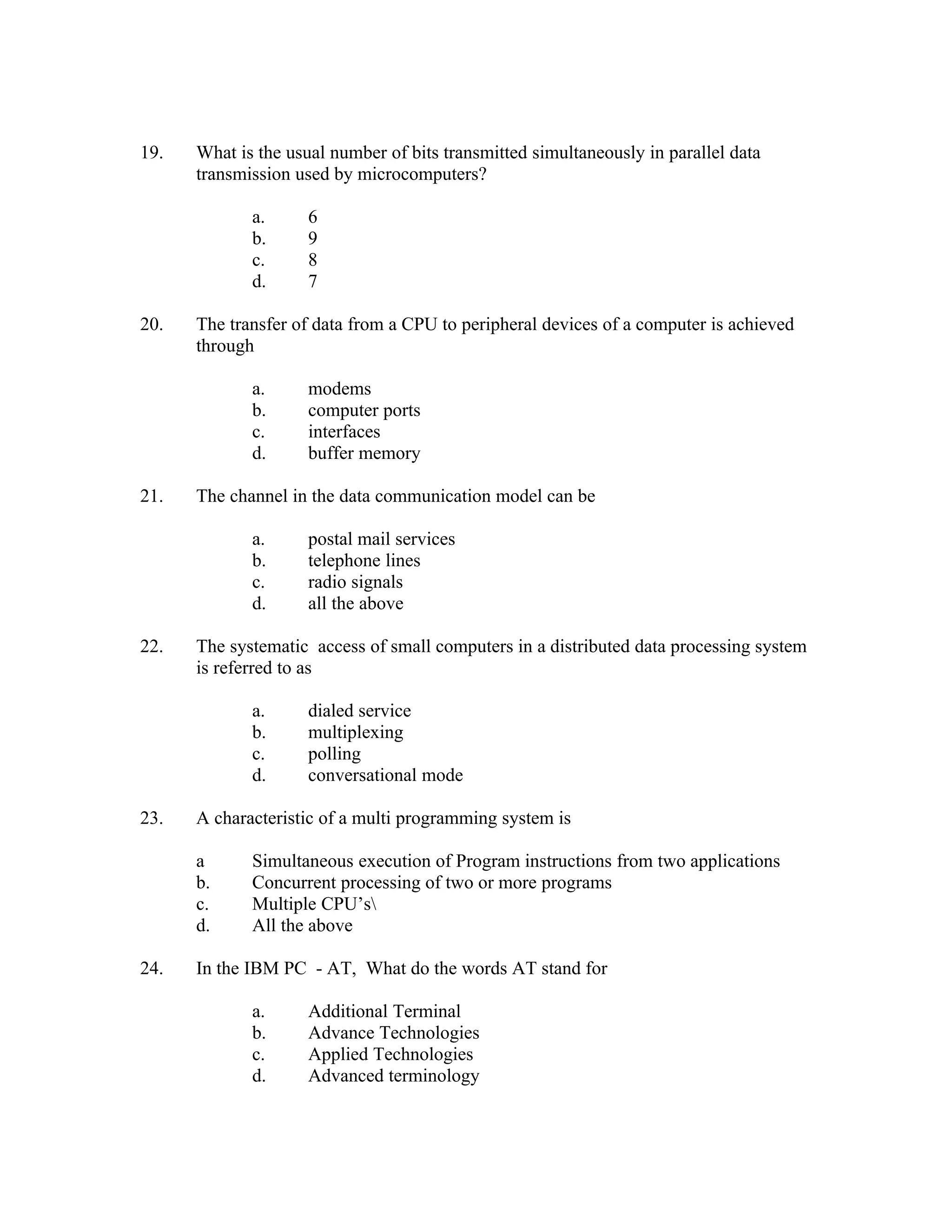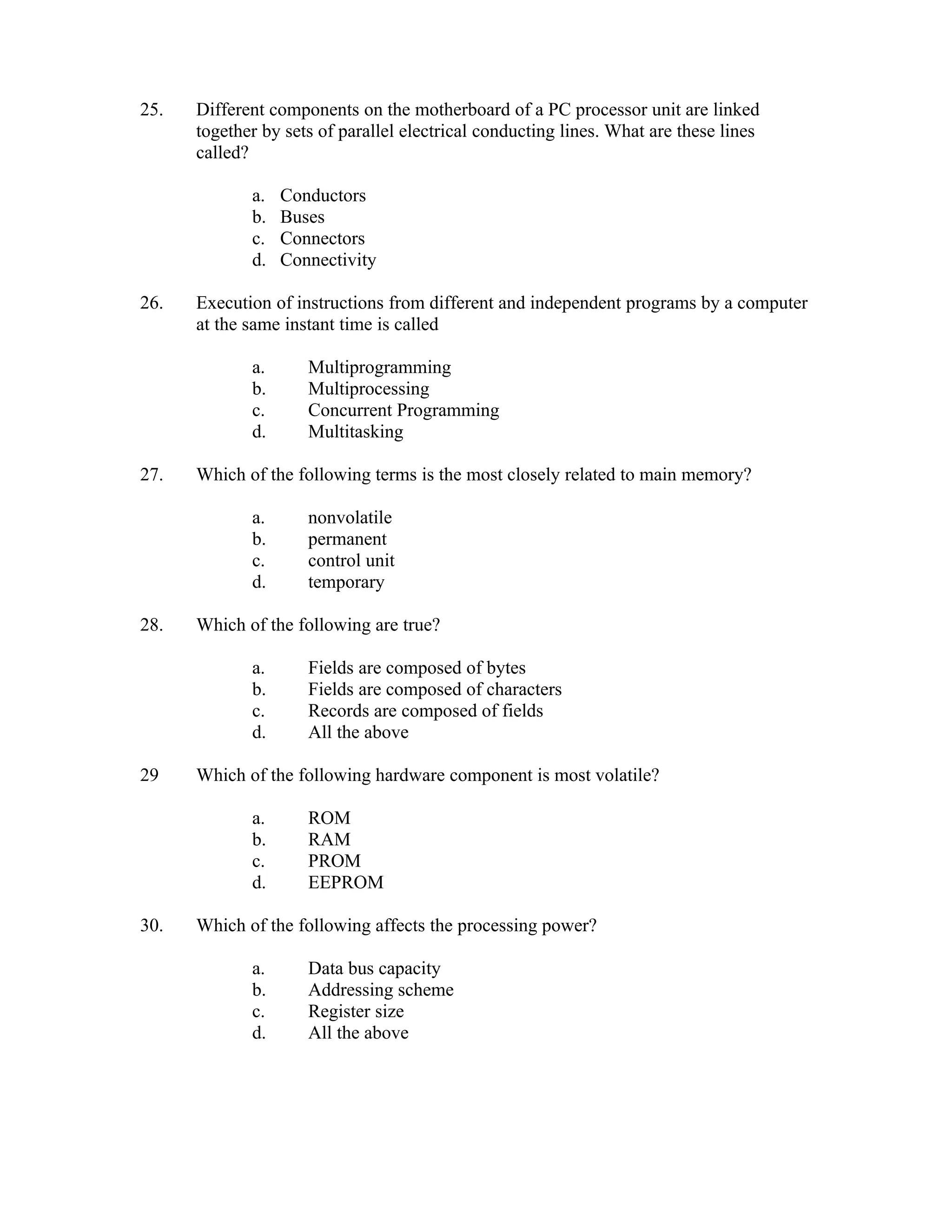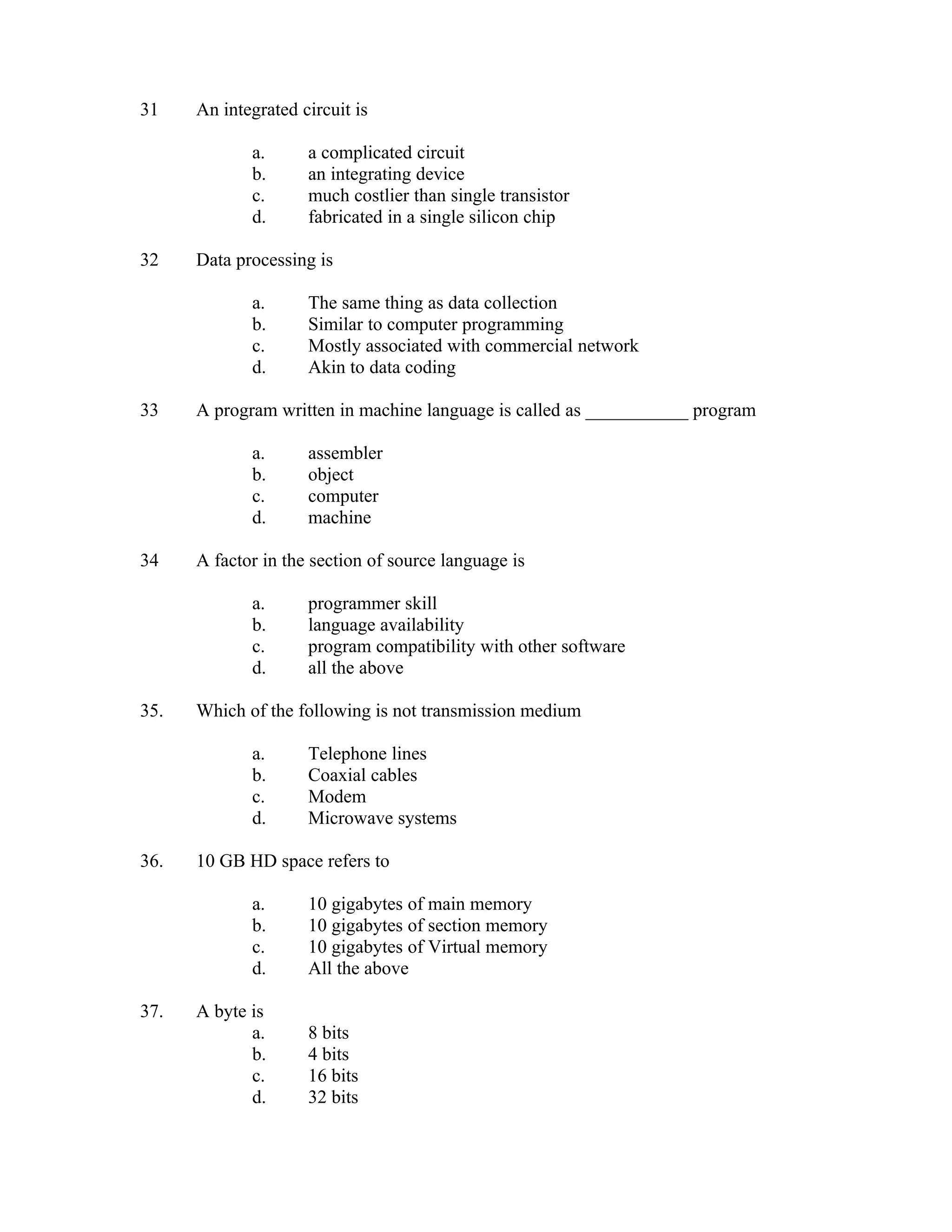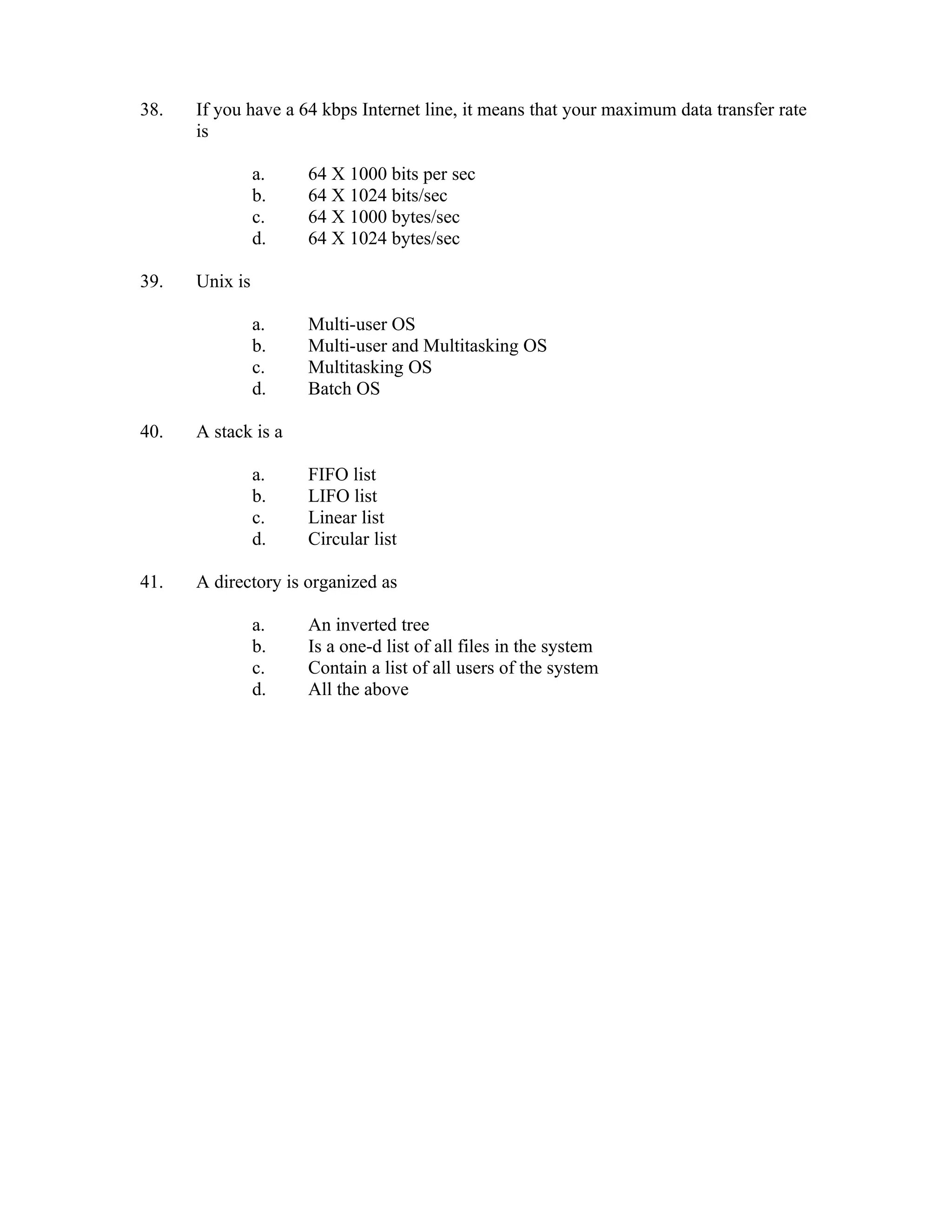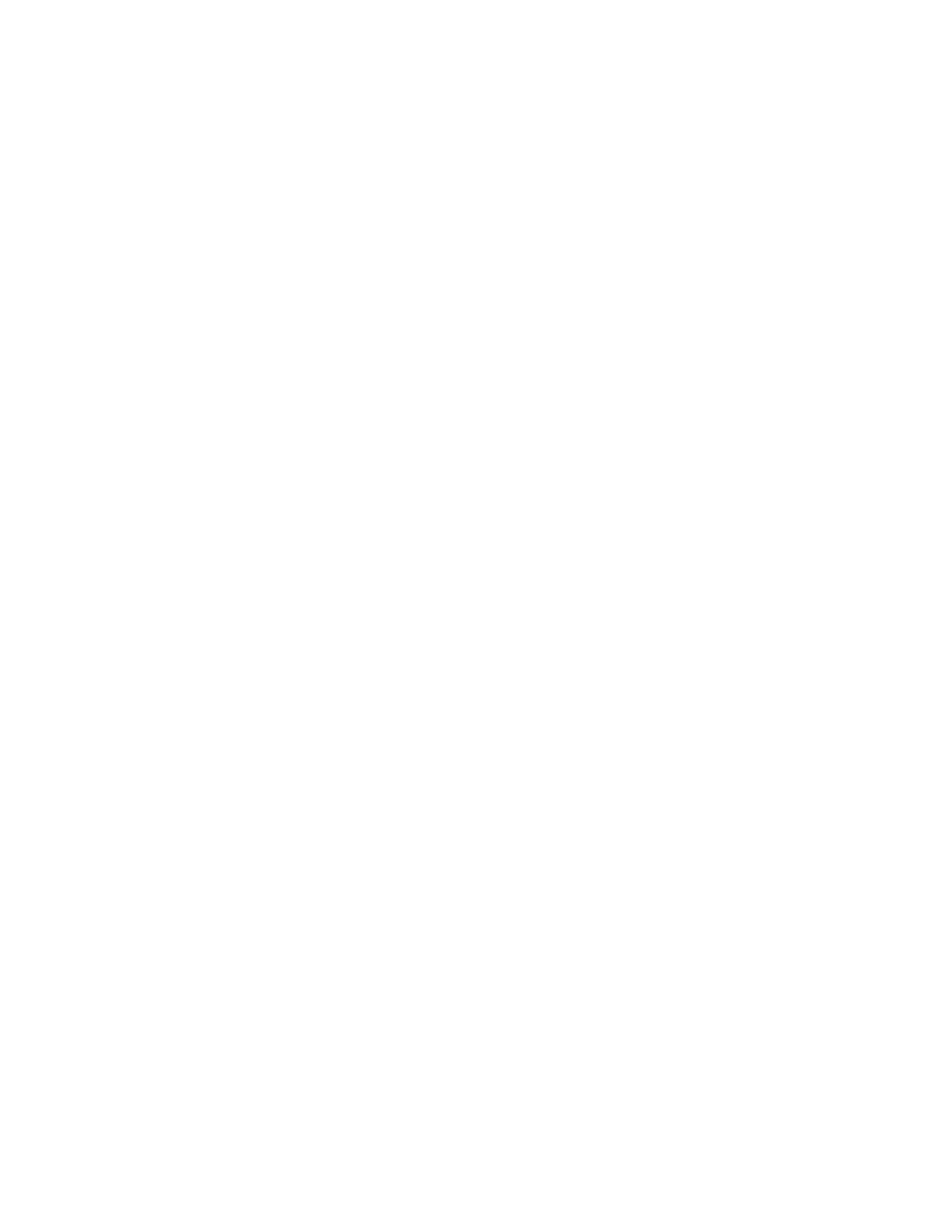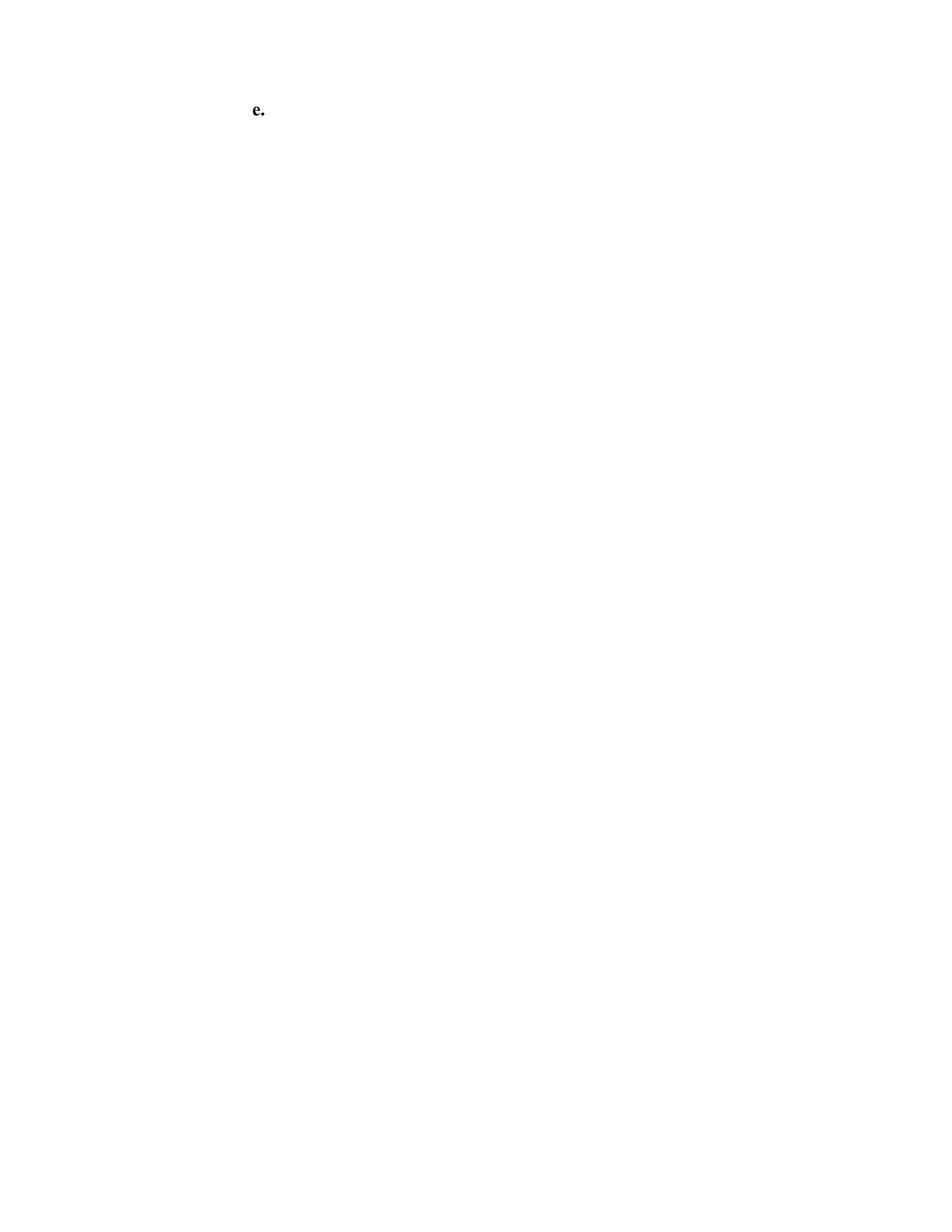The document contains 32 C programming questions and their multiple choice answers. The questions cover topics like operators, control flow, functions, arrays, structures, pointers and macros. Some key questions involve logical operators, recursion, structures, linked lists and string manipulation.
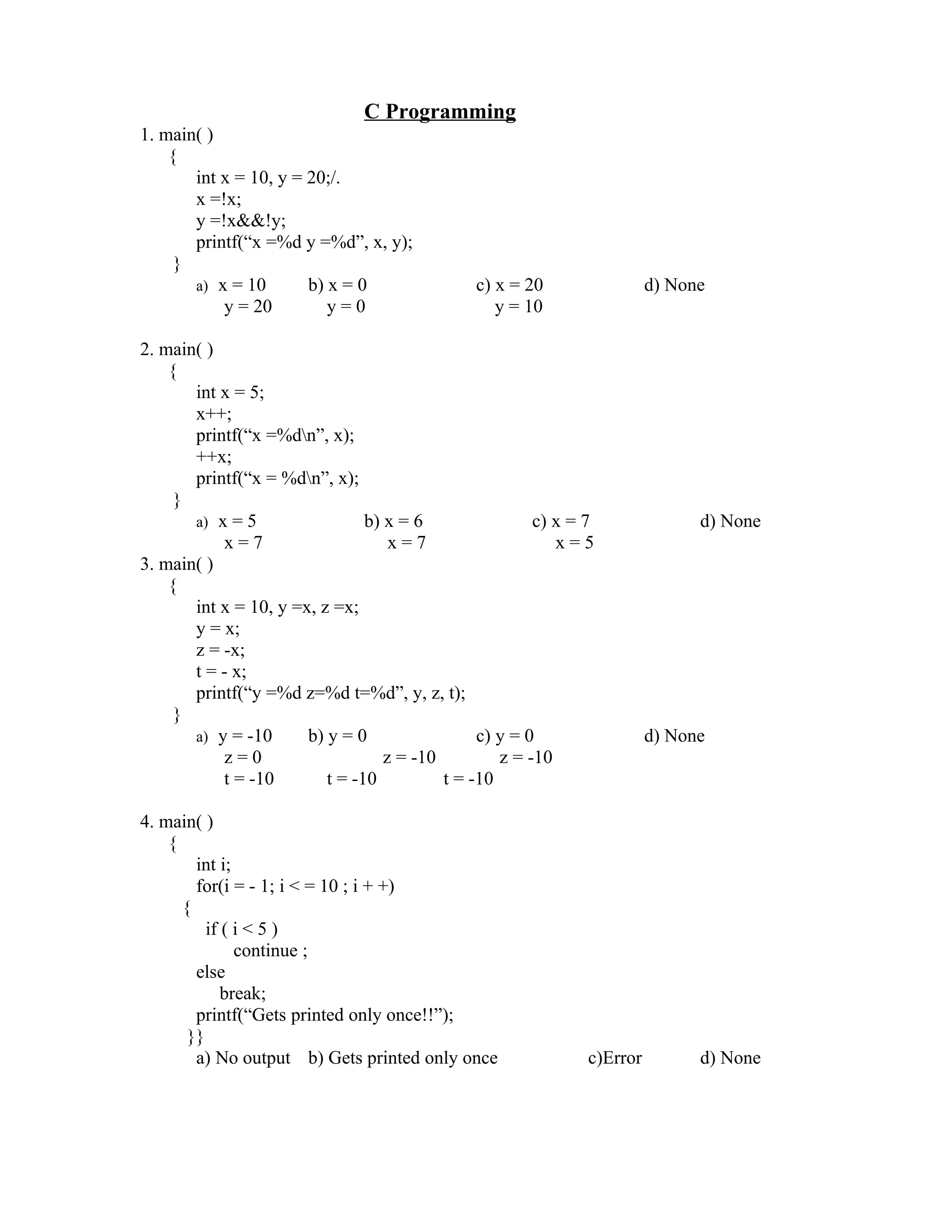
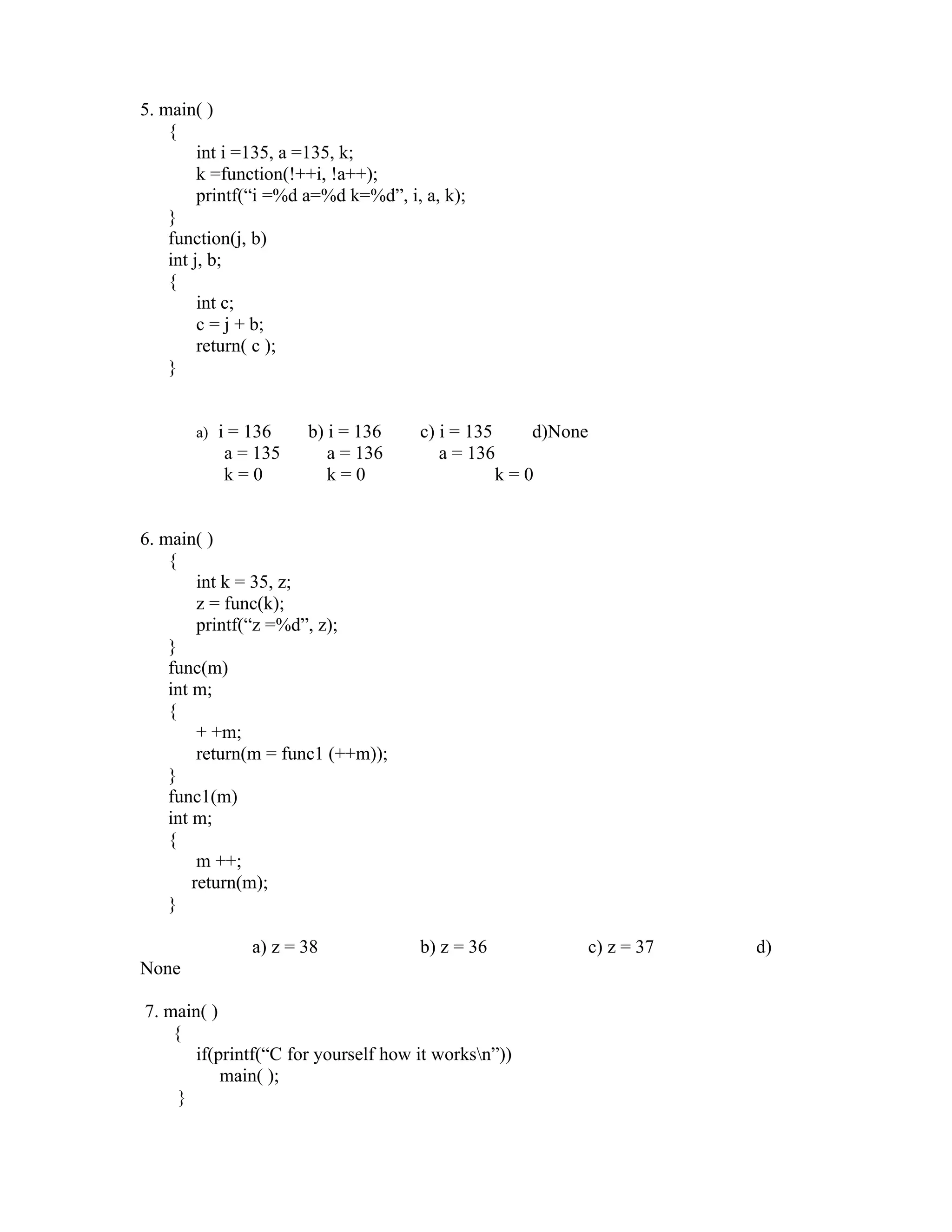
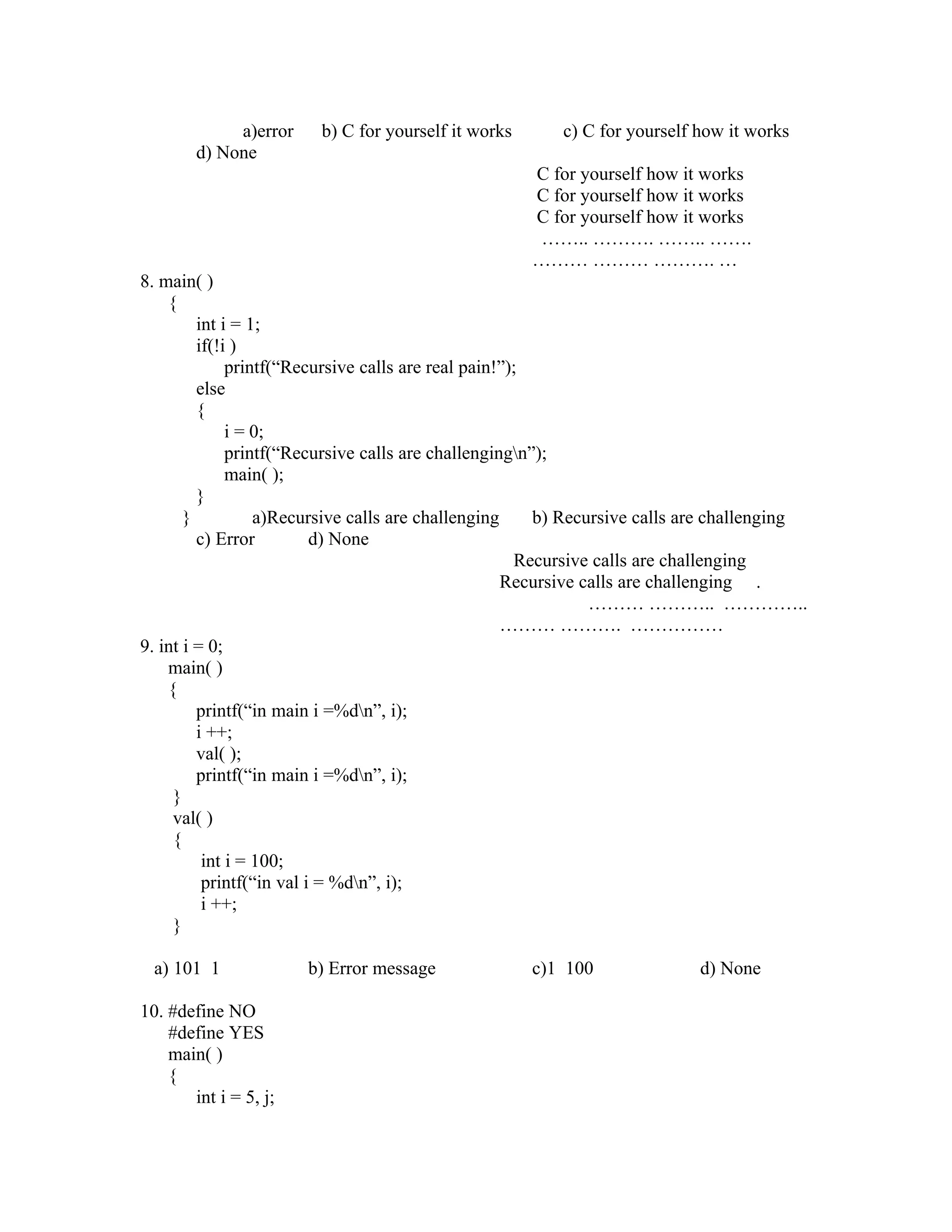
![if( i > 5)
j = YES;
else
j = NO;
printf(“%d”, j);
}
a) Yes Yes Yes Yes Yes Yes b) Error Message c) None d ) No No No
11. #define AND &&
#define OR ||
#define LE <=
#define GE >=
main( )
{
char ch = ‘D’;
if((ch GE 65 AND ch LE 90) OR (ch GE 97 AND ch LE 122))
printf(“Alphabet”);
else
printf(“Not an alphabet”);
}
a) No Alphabet b) Alphabet c) error d)None
12. main( )
{
int n[25];
n[0] = 100;
n[24] = 200;
printf(“%d %d”, *n, *(n + 24) + *(n + 0));
}
a) 200 100 b) 100 300 c) 100 200 d) None
13. main( )
{
int arr[ ] = { 0, 1, 2, 3, 4};
int i, *ptr;
for(ptr = arr + 4; ptr = arr; ptr--)
printf(“%d”, *ptr);
}
a) 0 1 2 3 4 b) 4 3 2 1 0 c) 1 2 3 4 0 d)None
14. main( )
{
static char s[ ] = “Rendezvours!”;
printf(“%d”, *(s + strlen(s)));](https://image.slidesharecdn.com/ctechquestions-110214063705-phpapp01/75/C-tech-questions-4-2048.jpg)
![}
a) 0 b) 1 c) e d) None
15. main( )
{
static char str[ ] = { 48, 48, 48, 48, 48, 48, 48, 48, 48, 48};
char *s;
int i;
s = str;
for(i = 0; i <=9; i++)
{
if(*s)
printf(“%c”, *s);
s++;
}
}
a)0 0 0 0 0 0 0 0 0 0 b) 1 1 1 1 1 1 1 1 1 1 c) 48 48 48 48 48 48 48 48 48 48 d) None
16. main( )
{
struct employee
{
char name[25];
int age;
float bs;
};
struct employee e;
e.name = “Hacker”;
e.age = 25;
printf(“%s%d”, e.name, e.age);
}
a) Hacker, 25 b) Error message c) 25 Hacker d) None
17. main( )
{
struct s1
{
char*str;
int i;
struct s1*ptr;
};
static struct s1 a[ ] ={](https://image.slidesharecdn.com/ctechquestions-110214063705-phpapp01/75/C-tech-questions-5-2048.jpg)
![{“Nagpur”, 1, a + 1},
{“Raipur”, 2, a + 2},
{“Kanpur”, 3, a}
};
struct s1*p = a;
int j;
for (j = 0; j <=2; j++)
{
printf(“%d”, --a[j].i);
printf(“%sn”, ++a[j].str);
}
}
a) 1 aipur b) 0 agpur c) 0 aipur d) None
0 agpur 1 aipur 1 agpur
2 anpur 2 anpur 2 anpur
18. #define NULL 0
main( )
{
struct node
{
struct node *previous;
int data;
struct node *next;
};
struct node *p, *q;
p = malloc(sizeof(struct node));
q = malloc(sizeof (struct node));
p->data = 75;
q->data = 90;
p->previous = NULL;
p->next = q;
q->previous = p;
q->next = NULL;
while(p!=NULL)
{
printf(“%dn”, p->data);
p =p->next;
}
}](https://image.slidesharecdn.com/ctechquestions-110214063705-phpapp01/75/C-tech-questions-6-2048.jpg)
![a) 90 b) 75 c) 90 d) None
75 90 90
19. main( )
{
struct a
{
int i;
int j;
};
struct b
{
char x;
char y[3];
};
union c
{
struct a aa;
struct b bb;
};
union c u;
u.aa.i = 512;
u.aa.j = 512;
printf(“%d%d”, u.bb.x, u.bb.y[0]);
printf(“%d%d”, u.bb.y[1], u.bb.y[2]);
}
a)2020 b) 0022 c) 0202 d) None
20. main( )
{
int a = 3, b = 2, c =1, d;
d = a| b & c;
printf(“d = %dn”, d);
d = a| b & ~ c;
printf(“d =%dn”, d);
}
a) d=2 b) d = 3 c) d = 1 d) None
d=2 d=3 d=1](https://image.slidesharecdn.com/ctechquestions-110214063705-phpapp01/75/C-tech-questions-7-2048.jpg)
![21. main( )
{
static char a[]=”Bombay”;
char *b=”Bombay”;
printf(“%d %d”,sizeof(a),sizeof(b));
}
a. 1 6 b. 1 1 c. 6 6 d. None
22. main( )
{
int i=3;
i=i++;
printf(“%d”,i));
}
a. 3 b. 4 c. undefined d. Error
23. What error would the following function give on compilation.
f (int a,int b)
{
int a;
a=20;
return a;
}
a. Missing parantheses in return statement.
b. The function should be defined as
int f(int a,int b)
c. Redeclaration of a.
d. None of the above.
24. main( )
{
int b;
b=f(20);
printf(”%d”,b);
}
int f(int a)
{
a>20?return (10):return (20);
}
a. 20 b. 10 c. No output d. Error
25. #define sqr(x) (x*x)
main( )](https://image.slidesharecdn.com/ctechquestions-110214063705-phpapp01/75/C-tech-questions-8-2048.jpg)
![{
int a,b=3;
a=sqr(b+2);
printf(“%d”,a);
}
a. 25 b. 11 c. Error d. Garbage value
26 #define str(x) #x
#define Xstr(x) str(x)
#define oper multiply
main( )
{
char *opername=Xstr(oper);
printf(“%s”,opername);
}
a. oper b. multiply c. Error d. None
27. main( )
{
printf(“%c”,7[“sundaram”]);
}
a. S b. m c. 0 d. Error
28. main( )
{
int a[ ]={10,20,30,40,50};
char *p;
p=(char *)a;
printf(“%d”,*((int *)p+4));
}
a. 50 b. 10 c. Error d. None
29. main( )
{
printf(“%c”,”abcdefgh”[4]);
}
a. a b. e c. Error d. None
30. main( )
{
printf(“%d %d %d”,sizeof(‘3’),sizeof(“3”),sizeof(3));
}
a. 1 1 1 b. 2 2 2 c. 1 2 2d. 1 1 1
Note: Assume size of int is 2 bytes.
31. main( )
{
struct emp{](https://image.slidesharecdn.com/ctechquestions-110214063705-phpapp01/75/C-tech-questions-9-2048.jpg)
![char n[20];
int age;}
struct emp e1={“david”,23};
struct emp e2=e1;
if(e1= = e2) printf(“structures are equal”);
}
a. structures are equal
b. No output
c. Error
d. None
32. main( )
{
char a[ ];
a[0] = ‘A’;
printf(“%c”, a[0]);
}
a) Compilation Error
b) No output
c) A
d) None
33. main( )
{
char **p =”Hello”;
printf(“%s”, **p);
}
a) Hello b) **p c) Error d) None
34. main( )
{
int count, end=20;
for (count=1; count<=end; count++)
{
if(count %2) continue;
else
if(count %4) continue;
else
if(count %6) continue;
else
if(count %8) continue;
else
if(count %10) continue;
else
if(count %12) continue;
else
printf(“%d”, count); }](https://image.slidesharecdn.com/ctechquestions-110214063705-phpapp01/75/C-tech-questions-10-2048.jpg)
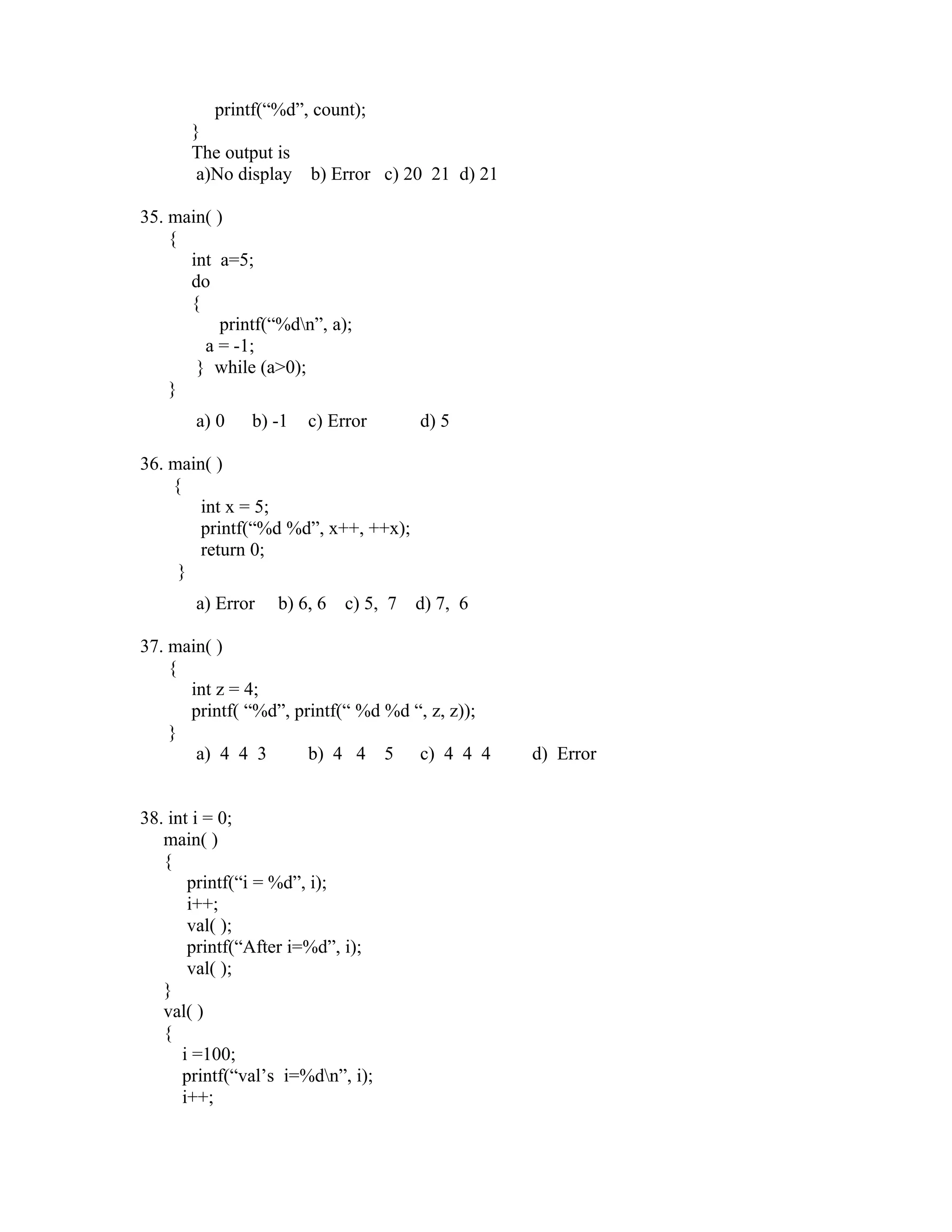
![}
a) i =0 b) i=0 c) Error d) None of the above
val’s i=100 val’s i =100
i =1 i=101
val’s i =100 val’s i =100
39. main( )
{
printf( “%d %c n”);
printf( “%d %c n”);
return 0;
}
a) Error b) d c d c c) Compilation error d) Some garbage value
will be the output
40. main( )
{
int i;
scanf( “%d”, &i);
switch( i ){
case 1 :
printf( “Do”);
case 2 :
printf( “ Re “);
case default :
printf( “ SACHIN “);
}}
The output will be
a) DO Re SACHIN b) SACHIN c) Do Re d) Error
41. # define COND(a > = 65 & & a < = 90)
main( )
{
char a = ‘R’;
if (COND)
printf(“ UPPER CASE”);
else
printf(“ LOWER CASE”);
}
a) LOWER CASE b) UPPER CASE c) ERROR-COMPILE d) RUN-TIME ERROR
42. main( )
{
int a[ ] = { 10, 20, 30, 40, 50};
int j;](https://image.slidesharecdn.com/ctechquestions-110214063705-phpapp01/75/C-tech-questions-12-2048.jpg)
![for (j = 0; j < 5; j++)
{
printf(“ n %d”, * a);
a ++;
}
}
a) 0..5 b) 0..4 c) Error d) None of the above
43. main( )
{
int a[ ] = { 10, 20, 30, 40, 50}
char *p;
p = (char *) a;
printf( “ %d”, * ((int*) p+4)); }
a) 50 b) 10 c) Error d) None
44. main( )
{
int a[5] = {2, 4, 6, 8, 10);
int i, b =5;
for(i=0; i<5; i++)
{
f(a[i], &b);
printf(“n %d %d”, a[i], b);
}
}
f(int x, int *y)
{
x = *(y) +=2;
}
a) 2 7 b) 4 9 c) 7 2 d) Error
4 9 6 11 9 4
6 11 8 13 11 6
8 13 10 15 13 8
10 15 12 17 15 10
45. main( )
{
int a,b;
b=7; printf(“%d”, a = =b);
printf(“%d”, a=b);
}
(a) 6 7 (b) 7 6 ( c ) 1 7 ( d ) 0 7](https://image.slidesharecdn.com/ctechquestions-110214063705-phpapp01/75/C-tech-questions-13-2048.jpg)
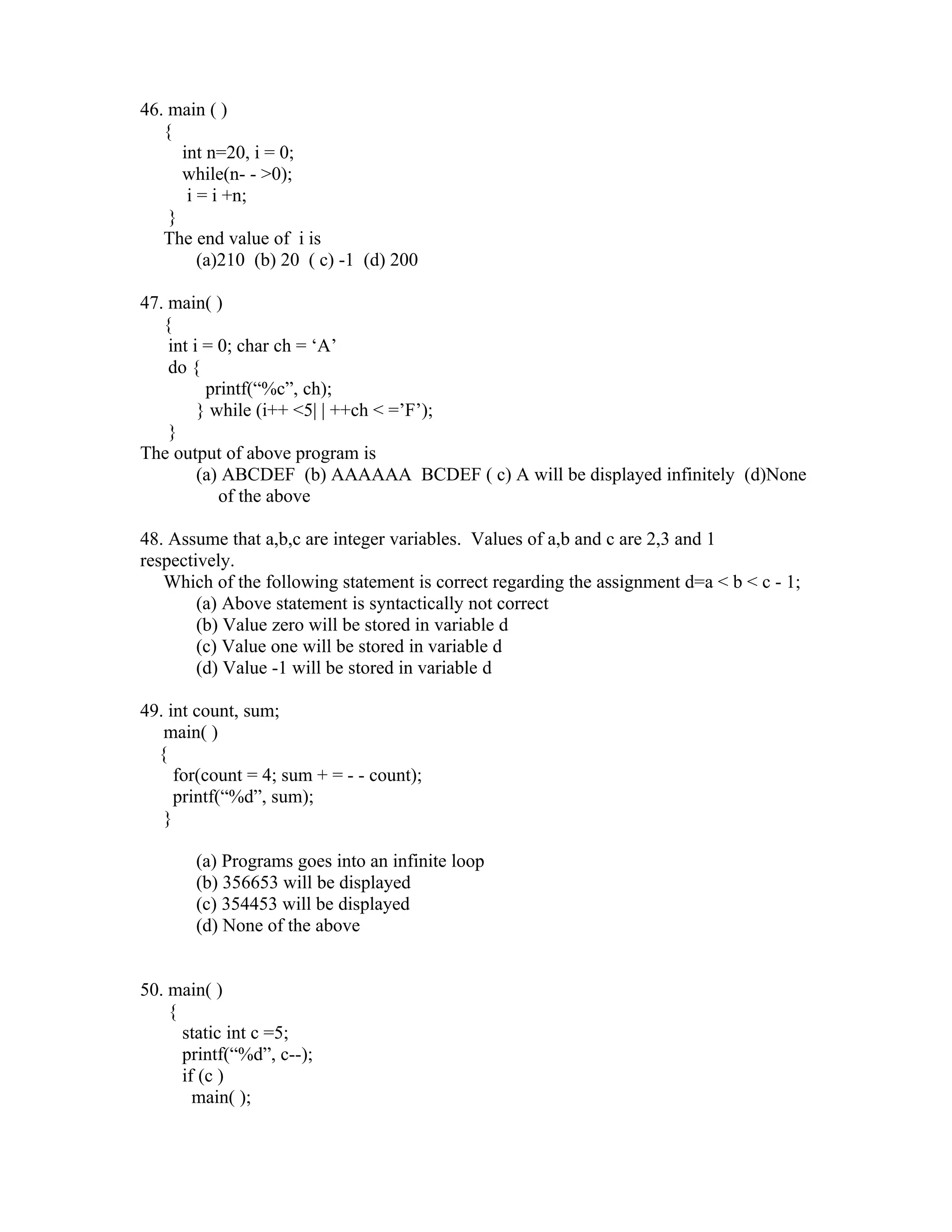
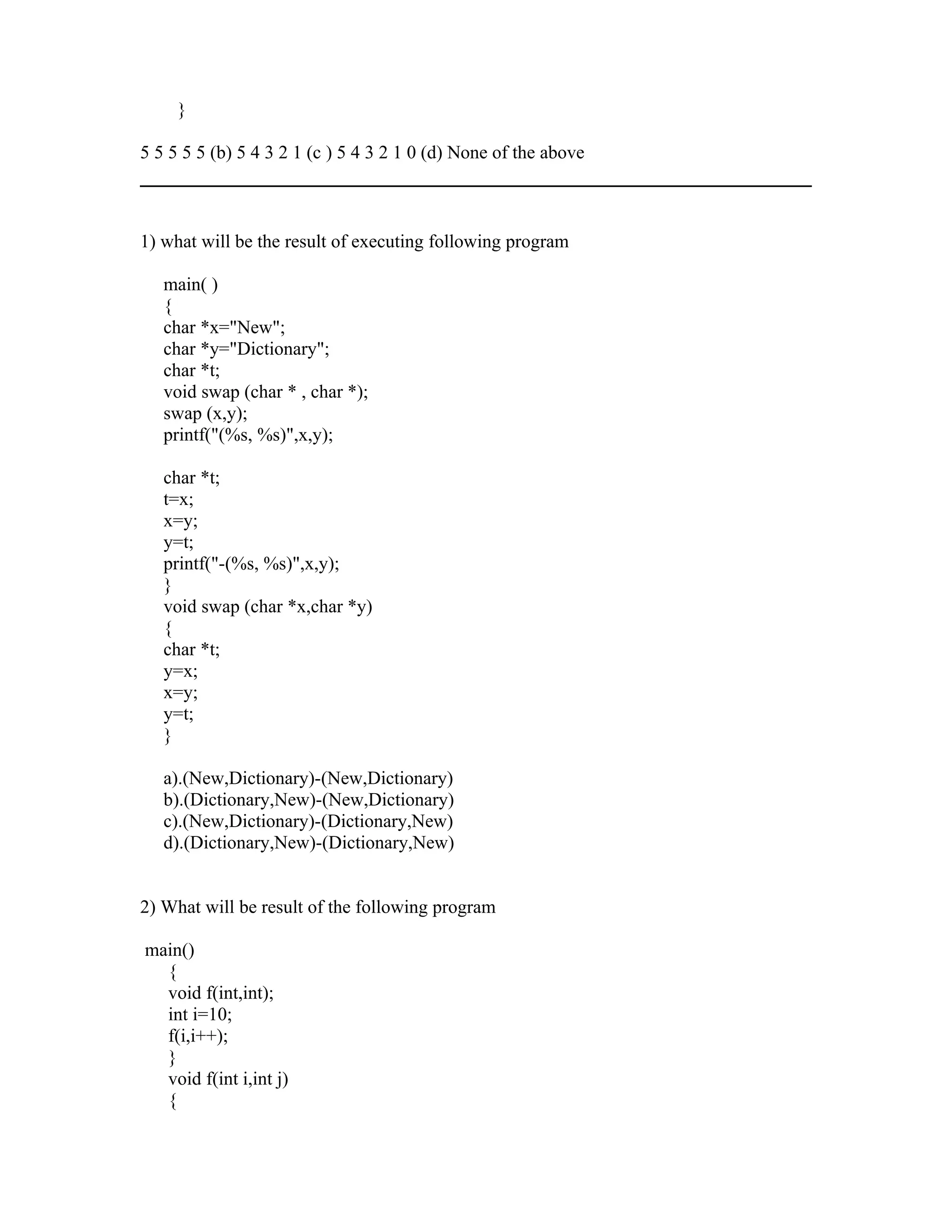
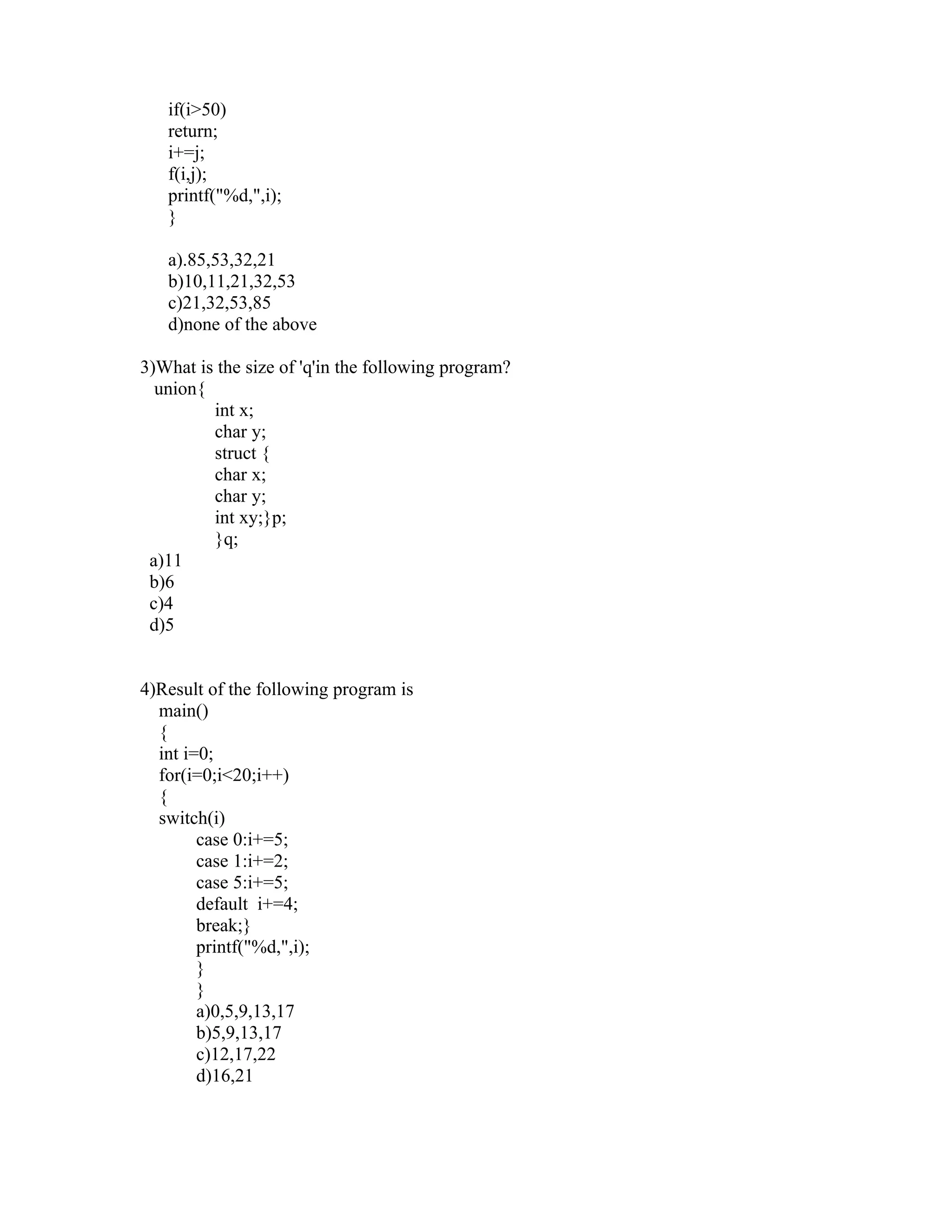
![5)What is the result
main()
{
char c=-64;
int i=-32
unsigned int u =-16;
if(c>i){
printf("pass1,");
if(c<u)
printf("pass2");
else
printf("Fail2");}
else
printf("Fail1);
if(i<u)
printf("pass2");
else
printf("Fail2")
}
a)Pass1,Pass2
b)Pass1,Fail2
c)Fail1,Pass2
d)Fail1,Fail2
e)none
6) main( )
{
struct employee
{
char name[25];
int age;
float bs;
}
struct employee e;
e.name = “ Hacker”;
e.age = 25;
printf(“%s%d”, e.name, e.age);
}
a) Hacker, 25 b) Hacker 25 c) Error d) None of the above
7) *p++
a)increments p,
b)increments value pointed by p
c) increments both
d none of the above](https://image.slidesharecdn.com/ctechquestions-110214063705-phpapp01/75/C-tech-questions-17-2048.jpg)
![w
8) What's wrong with the code "char c; while((c = getchar()) !=
EOF) ..."?
a) EOF cannot be used in while loop
b) EOF cannot be used with getchar
c) C should be an integer
d) None of the above
9) What is the O/P of the program given below
main( )
{
static char a[]=”Bombay”;
char *b=”Bombay”;
printf(“%d %d”,sizeof(a),sizeof(b));
}
a. 1 6 b. 1 1 c. 6 6 d. None
10 What is the O/P of the program given below
main( )
{
int I=3;
I=I+ +;
printf(‘%d”,I));
}
a. 3 b. 4 c. undefined d. Error
11What error would the following function give on compilation.
f (int a,int b)
{
int a;
a=20;
return a;
}
a. Missing parantheses in return statement.
b. The function should be defined as
int f(int a,int b)
c. Redeclaration of a.
d. None of the above.
2 )#define str(x) #x
#define Xstr(x) str(x)
#define oper multiply
main( )
{](https://image.slidesharecdn.com/ctechquestions-110214063705-phpapp01/75/C-tech-questions-18-2048.jpg)
![char *opername=Xstr(oper);
printf(“%s”,opername);
}
a. oper b. multiply c. Error d. None
13)main( )
{
printf(“%c”,7[“sundaram”]);
}
a. S b. m c. 0 d. Error
14)main( )
{
int a[ ]={10,20,30,40,50};
char *p;
p=(char *)a;
printf(“%d”,*((int *)p+4));
}
a. 50 b. 10 c. Error d. None
15)When a array int arr[MAXROW][MAXCOL] is passed to a function fun( ) then the
function fun( ) will be defined as
a. fun(int a[ ][MAXCOL])
b. fun(int a[ ][MAXROW])
c. fun(int (*ptr)[MAXCOL]))
d. fun(int a[ ])
16)main( )
{
printf(“%c”,”abcdefgh”[4]);
}
a. a b. e c. Error d. None
17)main( )
{
printf(“%d %d %d”,sizeof(‘3’),sizeof(“3”),sizeof(3));
}
a. 1 1 1 b. 2 2 2 c. 1 2 2d. 1 1 1
18)main( )
{](https://image.slidesharecdn.com/ctechquestions-110214063705-phpapp01/75/C-tech-questions-19-2048.jpg)
![struct emp{
char n[20];
int age;}
struct emp e1={“david”,23};
struct emp e2=e1;
if(e1= = e2) printf(“structures are equal”);
}
a. structures are equal
b. No output
c. Error
d. None
19)main( )
{
FILE *fp;
fp=fopen(“x1”,”r”);
}
fp points to
a) The first character in the file
b) A Structure which contains a char pointer which points to the first character in
the file.
c) Name of the file
d) None of the above
20)If the following program (myprog) is run from the command line as
myprog “*.c”
What would be the output?
main (int arg c, char *argv[ ])
{
int i;
for (i=1; i<argc; i++)
Printf(“%s”, argv [I]);
}
a) *.C
b) List of all .C files in the current directory
c) “*.C”
d) None
21)Which of the following is true about argv?
a) It is an array of character pointers
b) It is a pointer to an array of character pointers
c) It is an array of integers.
d) None](https://image.slidesharecdn.com/ctechquestions-110214063705-phpapp01/75/C-tech-questions-20-2048.jpg)
![22)If the following program (myprog) is run from the command line as
myprog Friday Tuesday Sunday
What would be the output?
main(int argc, char *argv[])
{
printf(“%C”, (* ++ argv)[0];
}
a) m b) f c) myprog d) Friday
23)main( )
{
int a;
char *[ ]= “Programming”;
for (a=0; x[a]! = ‘0’; a++)
if (( a%2 = =0) printf(“% C”, x[a]);
}
The output is
a) Programming b) rgamng c) Pormig d) None
24)float *(* x[20]) (int *a)
a) x is array of pointer to functions accepting integer pointer as an argument and
returning a pointer to float.
b) x is pointer to a function which accepts an array of pointers and returns a float
c) x is a pointer to a function that accepts a pointer to an integer array and returns
a character
d) None
25)Declaration for a pointer to function pointer that accepts an argument which is an
array of pointer 5 integers and returns a pointer to a character is
a) char * (* ptr) (int * a[5])
b) char (*x) (int (*a) [])
c) char * (*x) (int a[5])
d) char * (*x[5]) (int a[5])
26) main( )
{
int count, end=20;
for (count=1; count<=end; count++)
{
if(count %2) continue;
else
if(count %4) continue;
else](https://image.slidesharecdn.com/ctechquestions-110214063705-phpapp01/75/C-tech-questions-21-2048.jpg)
![if(count %6) continue;
else
if(count %8) continue;
else
if(count %10) continue;
else
if(count %12) continue;
else
printf(“%d”, count); }
printf(“%d”, count);
}
The output is
a)No display b) Error c) 20 21 d) 21
27)
main( )
{
int n[25];
n[0] = 100;
n[24] = 200;
printf(“n%d%d”, * n, *(n+24) + *(n+0));
}
a) 100 300 b) 100 200 c) Error d) 300, 100
28)
main( )
{
int i;
scanf( “%d”, &i);
switch( i ){
case 1 :
printf( “Do”);
case 2 :
printf( “ Re “);
case default :
printf( “ SACHIN “);
}}
The output will be
a) DO Re SACHIN b) SACHIN c) Do Re d) Error
29) . main( )
{
int b;
b = f(20);](https://image.slidesharecdn.com/ctechquestions-110214063705-phpapp01/75/C-tech-questions-22-2048.jpg)
![printf( “%d”, b);
}
int f(int a)
{
a>20 ? return(10) : return(20);
}
a) 20 b) 10 c) No output d) Error
30)
main( )
{
int arr[ ] = { 0, 1, 2, 3, 4};
int *ptr;
for (ptr = &arr[0]; ptr <= &arr[4]; ptr++)
printf(“%d”, *ptr);
}
a) 0 1 2 3 4 b) 1 2 3 4 5 c) Error d) Some Garbage Value
1) main( )
{
struct s1
{
char*str;
int i;
struct s1*ptr;
};
static struct s1 a[ ] ={
{“Nagpur”, 1, a + 1},
{“Raipur”, 2, a + 2},
{“Kanpur”, 3, a}
};
struct s1*p = a;
int j;
for (j = 0; j <=2; j++)
{
printf(“%d”, - - -a[j].i);
printf(“%sn”, ++a[j].str);
}
} a) 1 aipur b) 0 agpur c) 0 aipur d) None
0 agpur 1 aipur 1 agpur
2 anpur 2 anpur 2 anpur](https://image.slidesharecdn.com/ctechquestions-110214063705-phpapp01/75/C-tech-questions-23-2048.jpg)
![2) #define NULL 0
main( )
{
struct node
{
struct node *previous;
int data;
struct node *next;
};
struct node *p, *q;
p = malloc(size of(struct node));
q = malloc(size of (struct node));
p->data = 75;
q->data = 90;
p->previous = NULL;
p->next = q;
q->previous = p;
a->next = NULL;
while(p!=NULL)
{
printf(“%dn”, p->data);
p =p->next;
}
} a) 90 b) 75 c) 90 d) None
75 90 90
3) main( )
{
struct a
{
int i;
int j;
};
struct b
{
char x;
char y[3];
};
union c
{
struct a aa;
struct b bb;](https://image.slidesharecdn.com/ctechquestions-110214063705-phpapp01/75/C-tech-questions-24-2048.jpg)
![};
union c u;
u.aa.i = 512;
u.aa.j = 512;
printf(“%d%d”, u.bb.x, u.bb.y[0]);
printf(“%d%d”, u.bb.y[1], u.bb.y[2]);
}
a)2020 b) 0022 c) 0202 d) None
4)main( )
{
int a = 3, b = 2, c =1, d;
d = a| b & c;
printf(“d = %dn”, d);
d = a| b & ~ c;
printf(“d =%dn”, d);
} a) d = 2 b) d = 3 c) d = 1 d) one
d=2 d=3 d=1
5)
What is the output?
line 1 main ( )
line 2 {
line 3 char a{3}{3}=
{{‘a’,’b’,’c’},{‘p’,’q’,’r’},{‘x’,’y’,}}
line 4 char**p;
line 5 *p=a[0];
line 6 printf(“%sn”.*p);
line 7 }
c)
a)Abc Abcpqrxy
d). None of the above
b)Compilation error
6. What will be the output of this program?
#include<stdio.h>](https://image.slidesharecdn.com/ctechquestions-110214063705-phpapp01/75/C-tech-questions-25-2048.jpg)
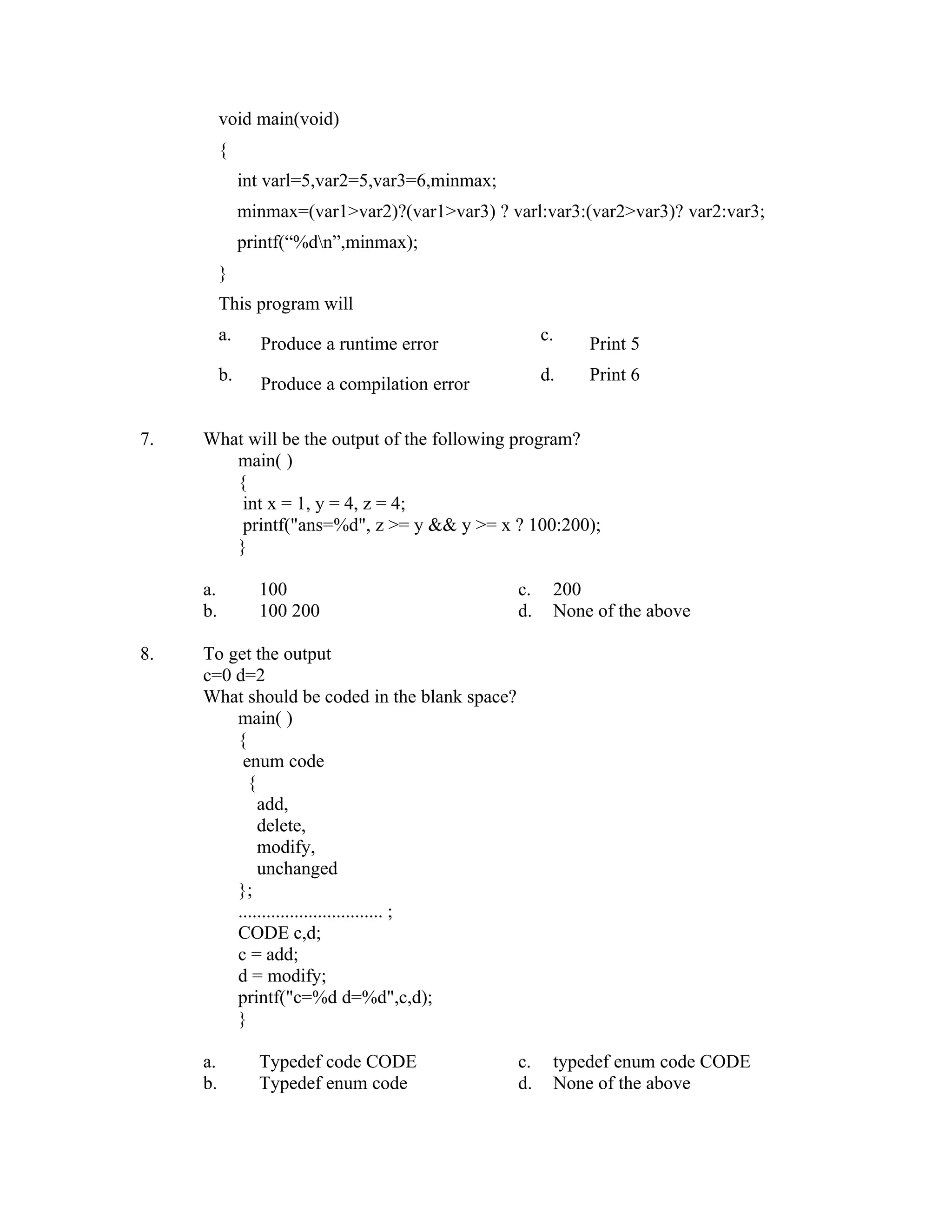
![9
#include"stdio.h"
main( )
{
FILE *fp;
Char str[80];
/*TRIAL.C contains only one line:
it’s a round,round,round world!*/
fp=fopen(“TRIAL.C","r");
________________________ ;
puts(str);
}
To get this output "its a round, round, round world!" in an infinite loop, what should
be coded in the blank space.
a. While(fgets(Str,80,fp)!=EOF) c. while(getch(fp)!=EOF
b. While(fp!=NULL) d. None of the above
10)What will be the output of the following program?
#define ISLOWER(a) (a >= 97 && a <= 127)
#define TOUPPER(a) (a-32)
main( )
{
char ch='c';
if(ISLOWER(ch))
ch=TOUPPER(ch);
printf("%c",ch);
}
a. C c. 99
b. C d. None of the above
11)for(; i<5;) is equivalent to
1. while(i<5) statements;
2. do statements;
while(i<5);
3. if(i<5) statements;
a. 1,2,3 b. 2 c. 1,2 d. 1
12) If a = 010011 then a << 2 is](https://image.slidesharecdn.com/ctechquestions-110214063705-phpapp01/75/C-tech-questions-27-2048.jpg)
![a. 010110
b. 011100
c. 101100
d. None of the above
13. If you are using “open” function for opening a file the file handle should be of
____________ type.
a) FILE
b) int
c) char
d) None of the above
14)main( )
{
static float a[ ] = { 13.24, 1.5}
float *j, *k;
j = a;
k = a + 2;
j = j * 2;
k = k/2;
printf(“%f%f ”, *j, *k);
}
a) Error b) Some value c) No output d) None of the above
15)main( )
{
static char s[ ] = “Rendezvous”;
printf(“%d”, *(s+ strlen(s)));
}
a) 0 b) Rendezvous c) ‘0’ d) Error
16)# include “stdio.h”
main( )
{
FILE *fp;
char c;
fp = fopen(“TRY.C, “,”r”);
if(fp = NULL)
{
puts(“Cannot open file”);
exit(1)
}
while((c =getc(fp))! = EOF)](https://image.slidesharecdn.com/ctechquestions-110214063705-phpapp01/75/C-tech-questions-28-2048.jpg)
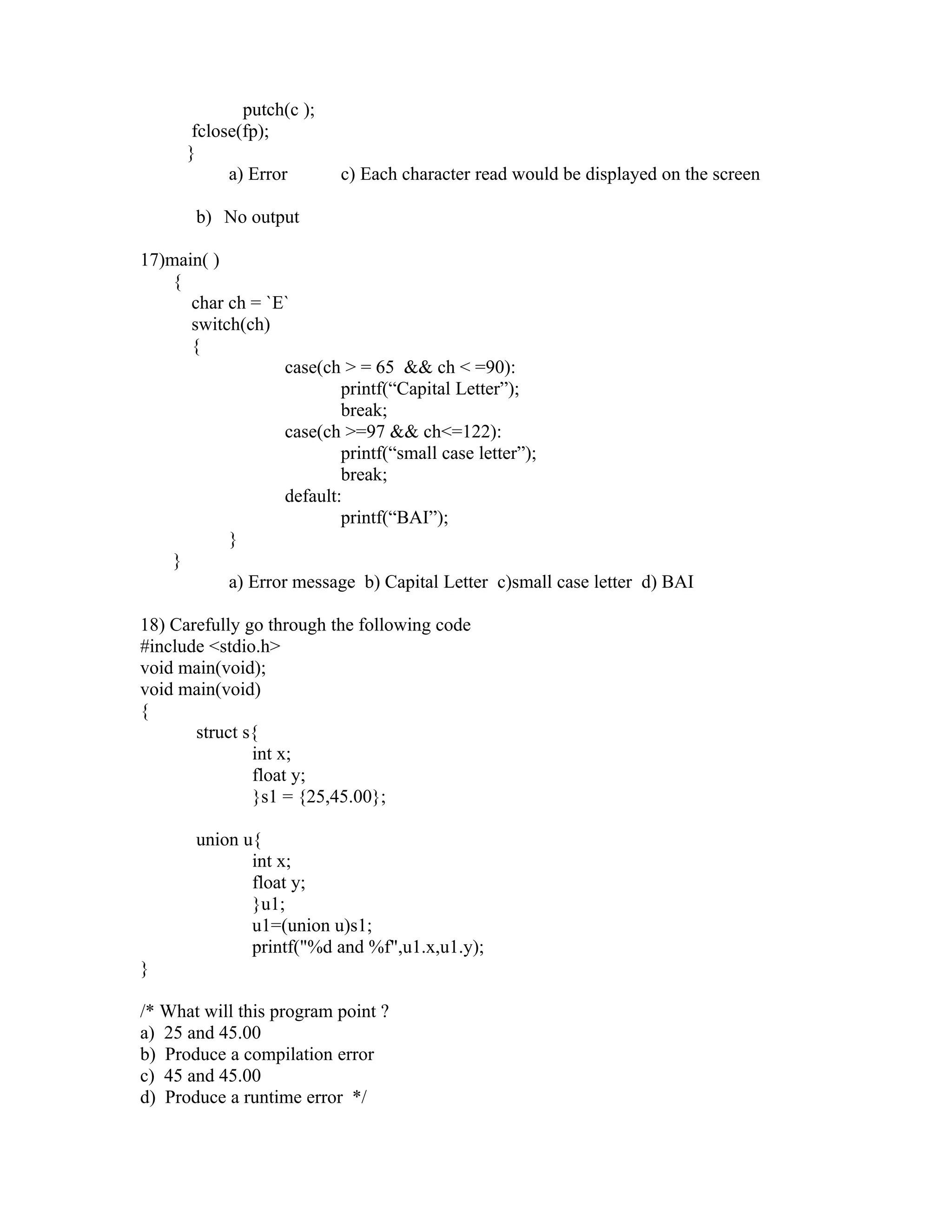
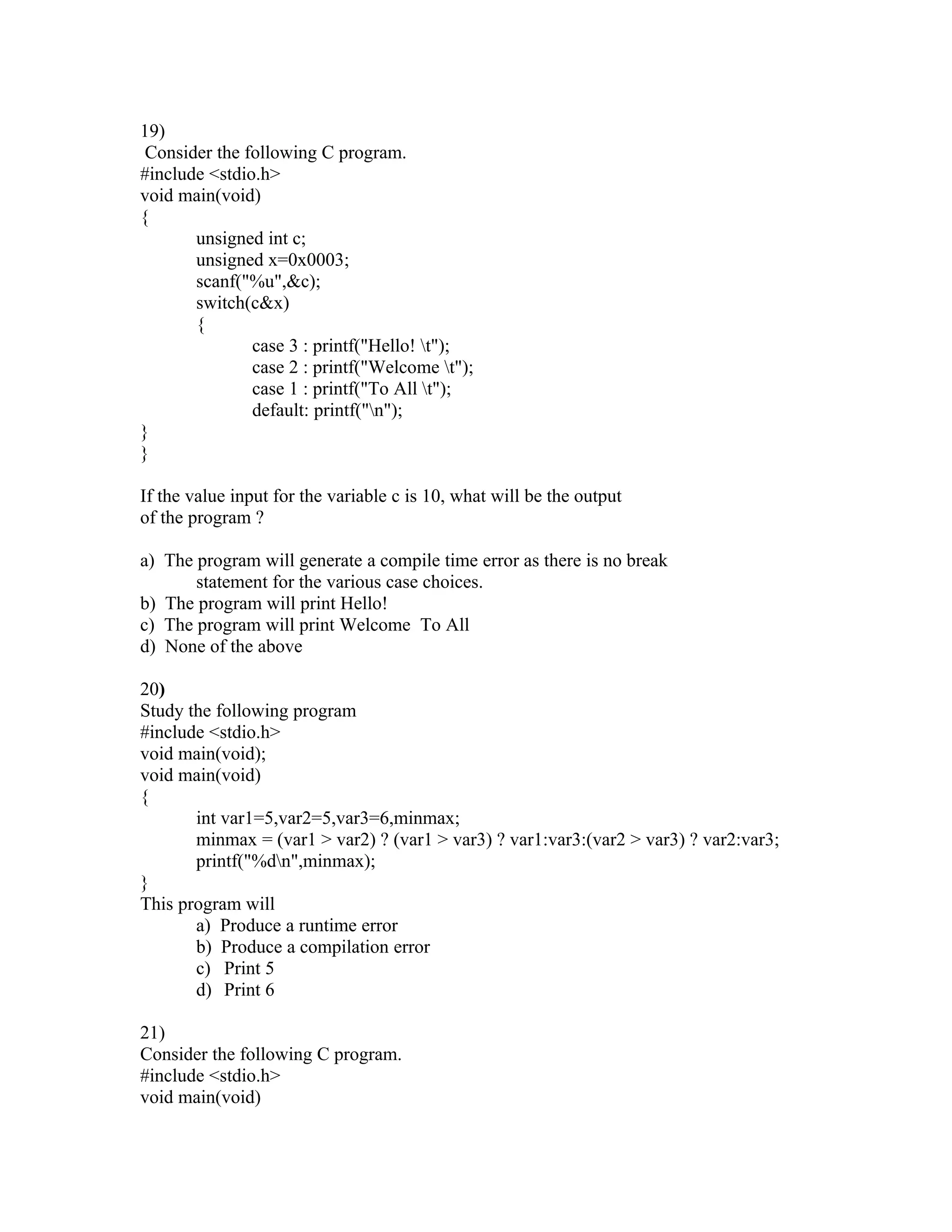
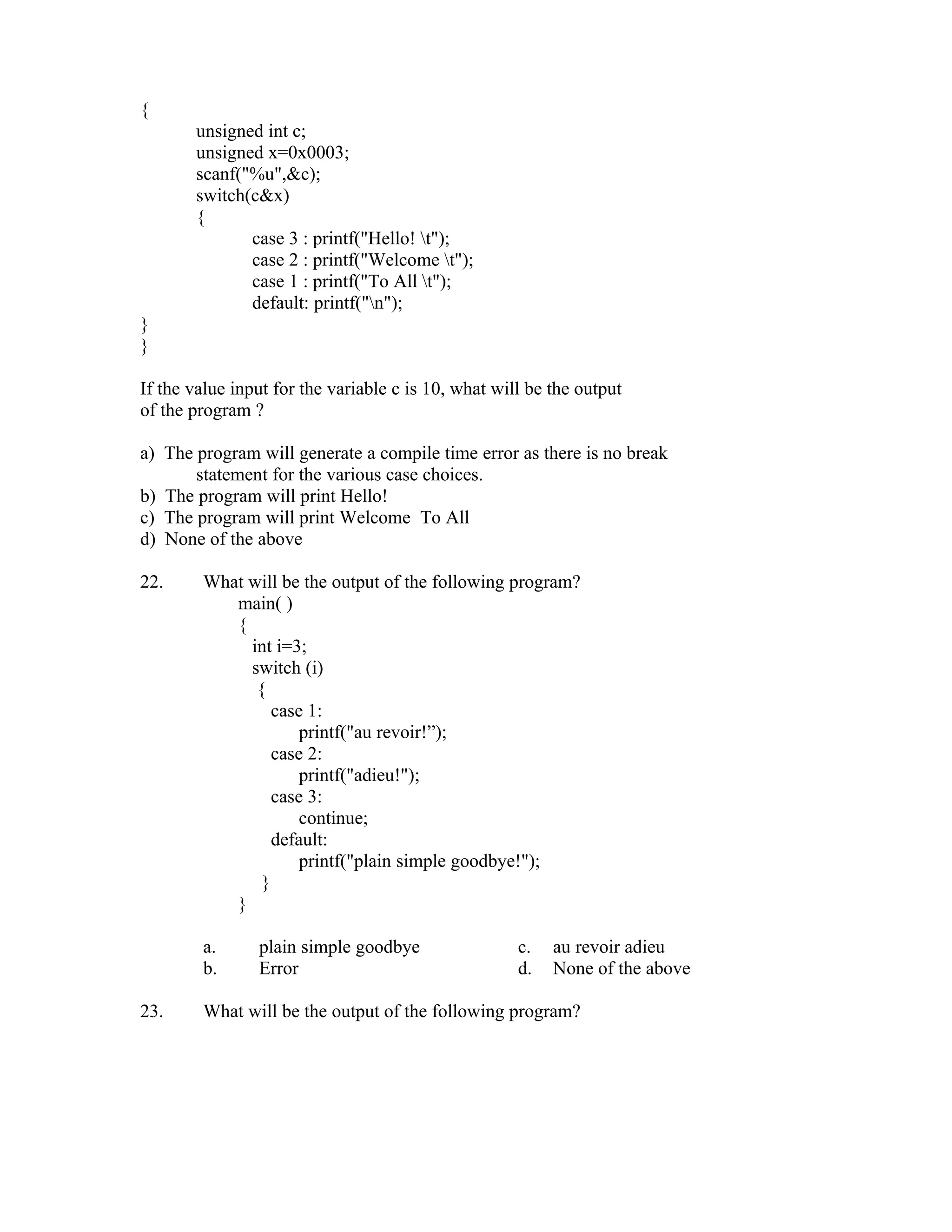
![main( )
{
static float a [ ]={13.24,1.5,1.5,5.4,3.5};
float *j, *k;
j=a;
k=a+4;
j=j*2;
k=k/2;
printf("%f %f",*j,*k);
}
a. 13.24 1.5 c. Compilation error
b. 15.5 5.4 d. Runtime error
24. What is the output of the following code?
main ( )
{
struct xyz
{
int I;
int k;
} pqr = {100,300};
struct xyz *z;
z=&pqr;
z->I=300;
z->k=100;
abc(z)
}
abc(char *p)
{
p++;
printf(“%dn”,*p);
}
a. 5
b. 1
c. 2
d. None of the above
25. What will be the output of the code given below?
main ( )
{
int c =0,d=5,e=10, a;
a=c>1?d>1||e>1? 100:200:300;
printf(“a=%d”,a);
}](https://image.slidesharecdn.com/ctechquestions-110214063705-phpapp01/75/C-tech-questions-32-2048.jpg)
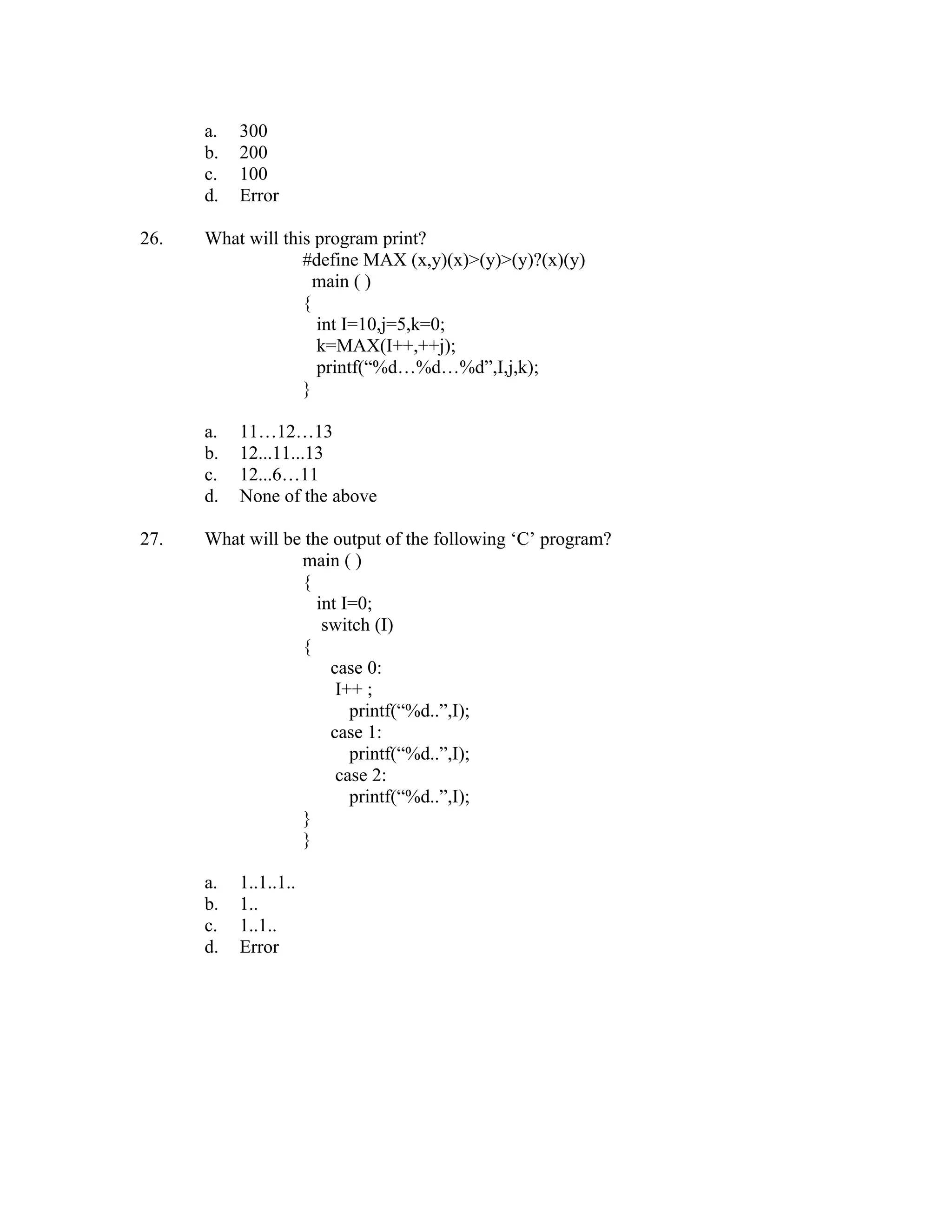
![28. What will be the output of the code given below?
main ( )
{
static char *s [ ] ={
“ice”,
“green”,
“cone”,
“please”
};
static char **ptr[ ]={s+3,s+2,s+1,s};
char ***p=ptr;
printf(“%sn”,**++p);
printf(“%sn”,*--*++p+3);
printf(“%sn”,*p[-2]+3);
printf(“%sn”,p[-1][-1]+1);
}
A cone B ase C reen D None
ase cone ase
reen reen cone
29 What will be the result of the following program?
main ( )
{
void f(int,int);
int i=10;
f(i,i++);
}
void f(int i, int j)
{
if(i>50)
return;
i+=j;
f(i,j);
printf(“%d”,i);
}
a. 85,53,32,21 b. 10,11,21,32,53 c. 21,32,53,85 d. None
30. What will be the output of the following code?
main ( )
{
FILE*fp;
fp=fopen(“TRIAL.C”,”r”);
fclose(fp);](https://image.slidesharecdn.com/ctechquestions-110214063705-phpapp01/75/C-tech-questions-34-2048.jpg)
